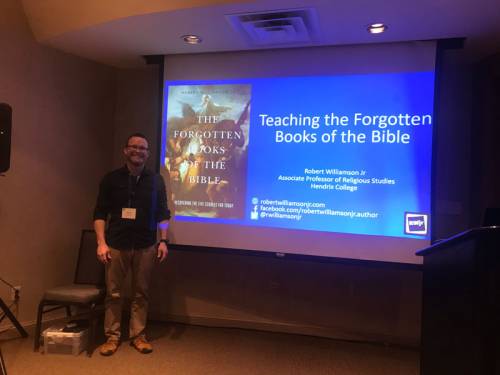APCE workshop leader: ‘Let each book speak its own claim on the truth’
by Mike Ferguson | Presbyterian News Service

Dr. Bobby Williamson, associate professor of Religious Studies at Hendrix College in Conway, Ark., led a workshop last week during the national gathering of the Association of Presbyterian Church Educators. (Photo by Mike Ferguson)
LITTLE ROCK, Ark. — If Dr. Bobby Williamson had his way, Presbyterians would be hearing more sermons on what he calls five forgotten books of the Bible — The Song of Songs, Ruth, Lamentations, Esther and Ecclesiastes.
Last week, Williamson, an associate professor of Religious Studies at Hendrix College in Conway, Ark., presented a workshop on how to appreciate those five forgotten books. His talk came as part of the national gathering of the Association of Presbyterian Church Educators. He based the workshop on his 2018 book, “The Forgotten Books of the Bible: Recovering the Five Scrolls for Today,” which has a free study guide that may be found here.
In the Jewish tradition, the five books, known as the Five Scrolls, have been elevated to the status of festival scrolls, each being read on a major Jewish holiday. But in the Christian tradition, they have been all but forgotten, according to Williamson, who’s also the founding pastor of Mercy Community Church of Little Rock.
“These five books enriched the life and imagination of our Jewish siblings, but for most of us they have withered away,” he said. “What might happen if we reclaim these texts and take them seriously as Christian texts?”
“Let each book speak its own claim on the truth,” he told workshop participants. “Let’s take each one seriously.”
Song of Songs
Many people describe this book as allegory — God’s love for Israel or Jesus’ love for the church. “But if you read it, you know that’s not really what it’s about. It’s erotic love poetry,” Williamson said. “It takes human sexuality seriously,” an “amazing part of what it means to be human.”
“The two (lovers) are caught up in the thrill of it all,” he said. The author “is not interested in objectifying people as sexual objects. Waiting for permission is a wonderful thing to be found in a biblical text.”
Ruth
Williamson labeled Ruth “the least forgotten of the five books.” He said the book speaks today to the nation’s response to immigrants. Although the book is set during the period of the judges, many scholars believe it was written during the time of Ezra and Nehemiah, about 500 years later, when the answer to the immigration question was, “foreign women are terrible, and we ought to send them away,” Williamson said.
“Here is a Moabite woman who figures out a way to integrate, and later you find out she is the great-grandmother of King David,” Williamson said. “Israel never would have been great in the first place had it not been for this Moabite woman. The book invites us to think about how we create outsiders.”
Lamentations
Drawing in part on the work of Kathleen H. O’Connor, Williamson said the book speaks today to communities and individuals who have been traumatized. “It’s written from the perspective of people who remain in the land and are trying to make sense of (the trauma) and recover from it,” he said.
Lamentations features four separate voices “who speak their own truth.” The author of Lamentations makes no effort to reconcile the different perspectives. One voice, known as Daughter Zion, says this, as paraphrased by Williamson: “I might have done some things wrong, and I might deserve punishment — but not this. Shame on you, God!”
Another voice, whom O’Connor identifies as the Strong Man, has this rejoinder: “Lean your cheek to the smiter, take your licks — and maybe tomorrow God will be faithful again.”
Esther
Williamson describes Esther as “quiet, meticulous and brilliant,” a queen who “works every protocol and ultimately saves her people.”
As for today, Esther poses this dilemma for us: do we protest, or do we legislate?
“Esther suggests we need both of those, and maybe more,” he said. “This moment requires me to do something. What can I do?”
Ecclesiastes
The author is known as Qoheleth, often translated as “the Preacher” or “the Teacher.” “I call him the Gatherer,” Williamson said, because the root of “Qoheleth” is “gather.”
Throughout the book, Qoheleth calls life “pointless,” “vanity of vanities.” “No matter what you do,” Qoheleth tells readers, “it will be as if you never were.”

Dr. Bobby Williamson
“He doesn’t give us much to hang onto,” Williamson said. “We don’t understand what God is doing, so there’s no way to please God.” The Gatherer’s message is: “You’ve got to take whatever comes to you, because there’s no way of predicting it.”
“Spend some time with these biblical books,” Williamson said as the workshop concluded. “They are rich, rich, rich. They have something to say about what it means to be a human being living in a world like ours.”
“In all five books, God isn’t very present,” Williamson added. “We have to do the best we can with what we know. That’s what a life of faith feels like.”
![]() You may freely reuse and distribute this article in its entirety for non-commercial purposes in any medium. Please include author attribution, photography credits, and a link to the original article. This work is licensed under a Creative Commons Attribution-NonCommercial-NoDeratives 4.0 International License.
You may freely reuse and distribute this article in its entirety for non-commercial purposes in any medium. Please include author attribution, photography credits, and a link to the original article. This work is licensed under a Creative Commons Attribution-NonCommercial-NoDeratives 4.0 International License.
Categories: Communication, Education
Tags: APCE, association of presbyterian church educators, christian formation, dr. bobby williamson, ecclesiastes, esther, hendrix college, lamentations, mercy community church little rock, partner associations, ruth, song of songs, the forgotten books of the bible: recovering the five scrolls for today
Ministries: Communications